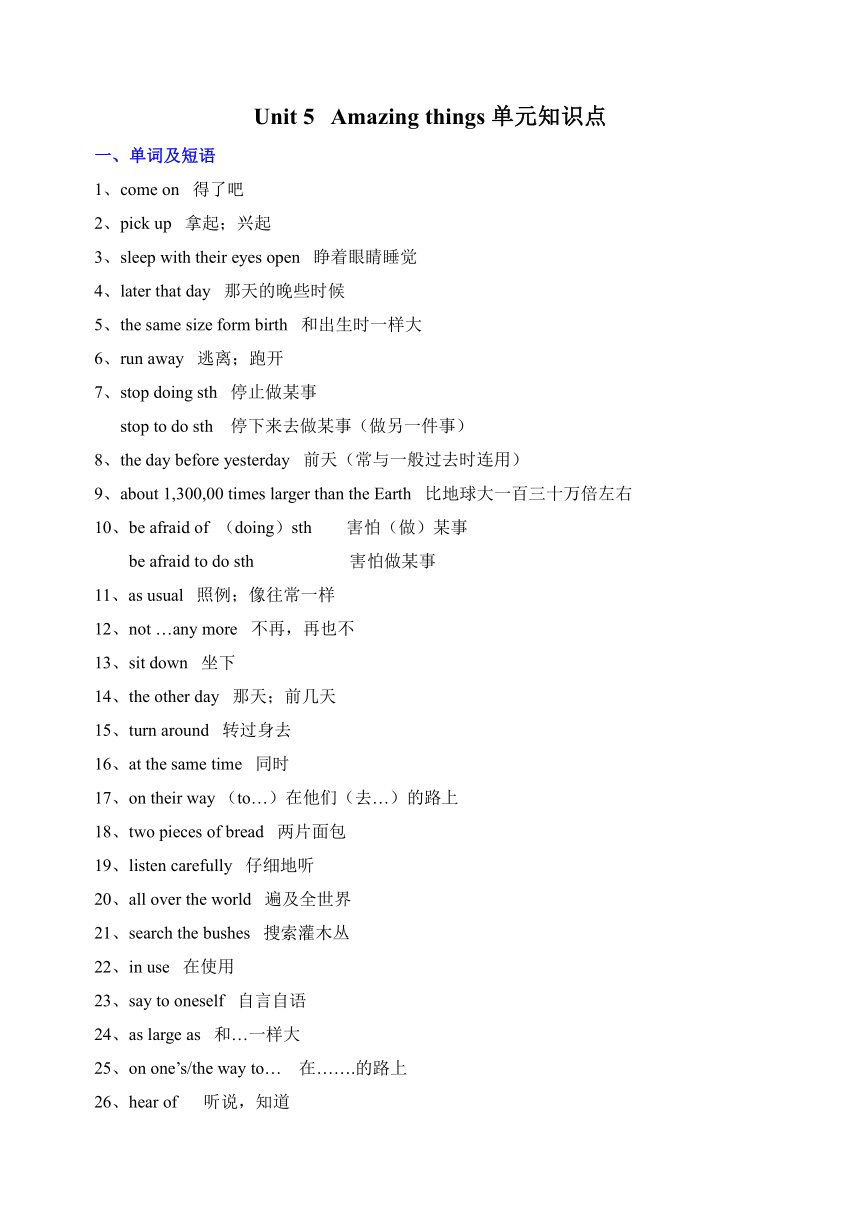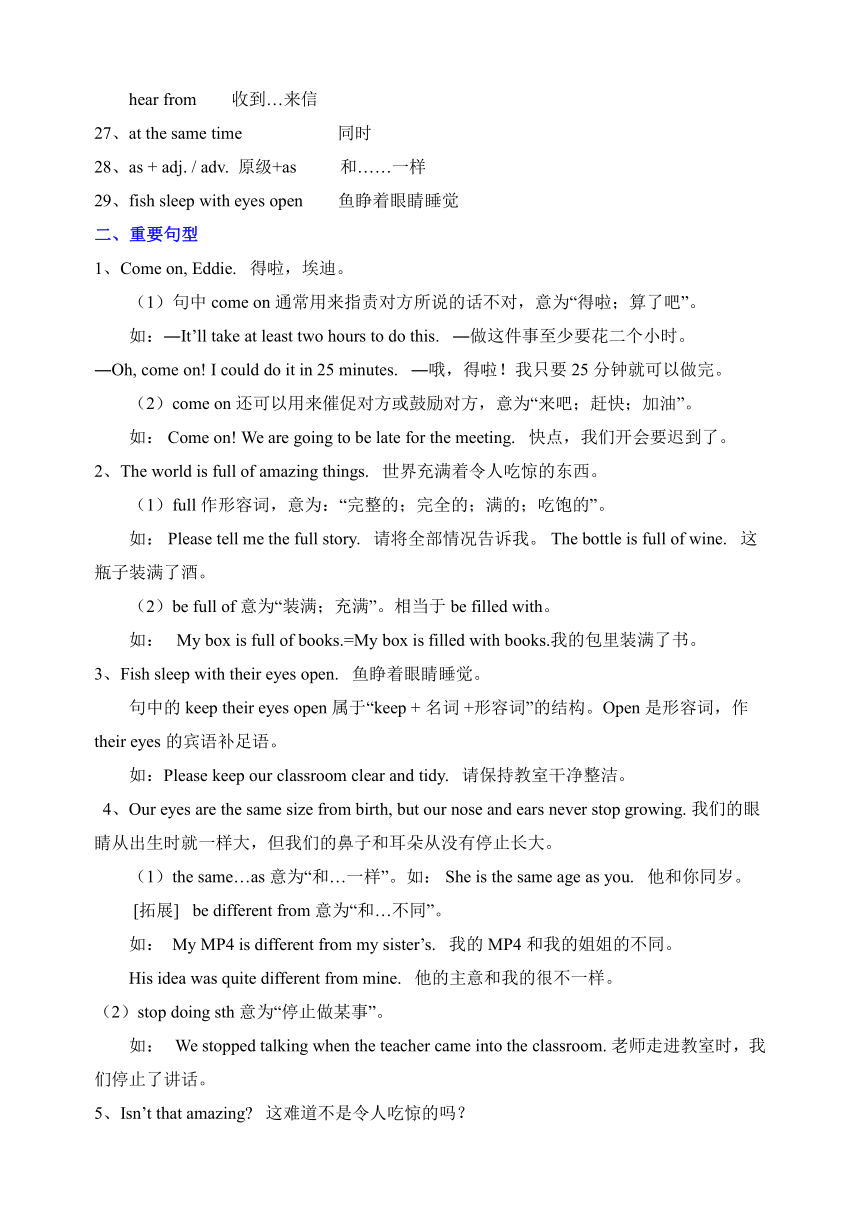译林版七年级下册英语第五单元Unit 5 Amazing things 单元知识点
文档属性
| 名称 | 译林版七年级下册英语第五单元Unit 5 Amazing things 单元知识点 |

|
|
| 格式 | doc | ||
| 文件大小 | 45.0KB | ||
| 资源类型 | 教案 | ||
| 版本资源 | 牛津译林版 | ||
| 科目 | 英语 | ||
| 更新时间 | 2024-03-13 00:00:00 | ||
图片预览


文档简介
Unit 5 Amazing things单元知识点
一、单词及短语
1、come on 得了吧
2、pick up 拿起;兴起
3、sleep with their eyes open 睁着眼睛睡觉
4、later that day 那天的晚些时候
5、the same size form birth 和出生时一样大
6、run away 逃离;跑开
7、stop doing sth 停止做某事
stop to do sth 停下来去做某事(做另一件事)
8、the day before yesterday 前天(常与一般过去时连用)
9、about 1,300,00 times larger than the Earth 比地球大一百三十万倍左右
10、be afraid of (doing)sth 害怕(做)某事
be afraid to do sth 害怕做某事
11、as usual 照例;像往常一样
12、not …any more 不再,再也不
13、sit down 坐下
14、the other day 那天;前几天
15、turn around 转过身去
16、at the same time 同时
17、on their way (to…)在他们(去…)的路上
18、two pieces of bread 两片面包
19、listen carefully 仔细地听
20、all over the world 遍及全世界
21、search the bushes 搜索灌木丛
22、in use 在使用
23、say to oneself 自言自语
24、as large as 和…一样大
25、on one’s/the way to… 在…….的路上
26、hear of 听说,知道
hear from 收到…来信
27、at the same time 同时
28、as + adj. / adv. 原级+as 和……一样
29、fish sleep with eyes open 鱼睁着眼睛睡觉
二、重要句型
1、Come on, Eddie. 得啦,埃迪。
(1)句中come on通常用来指责对方所说的话不对,意为“得啦;算了吧”。
如:―It’ll take at least two hours to do this. ―做这件事至少要花二个小时。
―Oh, come on! I could do it in 25 minutes. ―哦,得啦!我只要25分钟就可以做完。
(2)come on还可以用来催促对方或鼓励对方,意为“来吧;赶快;加油”。如: Come on! We are going to be late for the meeting. 快点,我们开会要迟到了。
2、The world is full of amazing things. 世界充满着令人吃惊的东西。
(1)full作形容词,意为:“完整的;完全的;满的;吃饱的”。
如: Please tell me the full story. 请将全部情况告诉我。 The bottle is full of wine. 这瓶子装满了酒。
(2)be full of意为“装满;充满”。相当于be filled with。如: My box is full of books.=My box is filled with books.我的包里装满了书。
3、Fish sleep with their eyes open. 鱼睁着眼睛睡觉。
句中的keep their eyes open属于“keep + 名词 +形容词”的结构。Open是形容词,作their eyes的宾语补足语。
如:Please keep our classroom clear and tidy. 请保持教室干净整洁。
4、Our eyes are the same size from birth, but our nose and ears never stop growing. 我们的眼睛从出生时就一样大,但我们的鼻子和耳朵从没有停止长大。
(1)the same…as意为“和…一样”。如: She is the same age as you. 他和你同岁。
[拓展] be different from意为“和…不同”。
如: My MP4 is different from my sister’s. 我的MP4和我的姐姐的不同。
His idea was quite different from mine. 他的主意和我的很不一样。
(2)stop doing sth意为“停止做某事”。
如: We stopped talking when the teacher came into the classroom. 老师走进教室时,我们停止了讲话。
5、Isn’t that amazing 这难道不是令人吃惊的吗?
本句是否定形式的一般疑问句,用于反问或希望得到肯定的问答。
如: Isn’t he a good boy 难道他不是一个好孩子吗? Aren’t they good friends 难道他们不是好朋友吗?
6、They turned around but saw nothing. 他们转过身来,但什么也没有看到。
(1)本句是but连接的并列句,but表转折。如: He is clever but he doesn’t work hard. 他很聪明,但不勤奋。
(2)turn around意为“转身”。如: I turned around and looked at the man angrily. 我转过身生气地看着那个男人。
7、On their way home, they met Andy. 在他们回家的路上,他们遇到了安迪。
(1)way作名词,意为“路;路线”,the way to表示“去某地的路”。如: Can you tell me the way to the library 请问去图书馆怎么走?
(2)way还可意为“方法;方式;方向;路程”等。
如: Use your hear, then you’ll find a way. 动动你的脑筋,你就会找出办法来的。 Come this way. 往这边走。
8、“What happened ”Andy asked. “发生了什么?”安迪问。
Happen是不及物动词,意为“(偶然)发生”。
如: The story happened in London. 这个故事发生在伦敦。
[拓展]
sth happen to sb 意为“某人发生某事”。如: She looked sad. What happened to her 她看起来很伤心。她怎么啦?
9、He searched the bushes. 他搜查灌木丛。
(1)search用作及物动词,意为“搜查;搜寻;搜索”,其宾语可以是房屋、人身、衣服等名词。
如:The police searched every room in the house. 警方搜查了那个房子的所有房间。
(2)search用作不及物动词,常和介词for连用,意为“到处寻找”,相当于look for。
The police are searching for his clothes. 警方正在搜寻他的衣服。
10、When it miaowed, it made a sound like a whisper. 当它叫时,发出像耳语的声音。
这是一个由when的时间状语从句,主句是it made a sound like a whisper。
注意:当主句是一般将来时的时候,时间从句要用一般现在时态。如: I will go home when I finish my work. 我完成了工作就回家。
11、Andy picked up the little cat and went to find Millie and Any. 安迪捡起那只小猫去找米莉和艾米。
(1)pick up 意为“捡起,拾起”,它是“动词+副词”构成的短语动词,当有名词作宾语时,名词的位置可位于副词的后面,也可位于副词的前面;但当有代词作宾语时,代词只能位于副词的前面。
如: He picked up the letter and read it. =He picked the letter up and read it. 他捡起那封信读了。
The phone rang and I picked it up. 电话响了,我接起了它。
(2)Pick up还可意为“(用车)接”。
如: A car picked us up at 7 at the hotel. 一辆车7点钟到饭店来接我们。
12、What else 还有别的什么吗?
else作形容词,意为“别的;其他的”,常用于疑问词what, who, where 等和不定代词something, anything, nothing, someone, anyone等之后,表示强调,语气较为强烈。
如: Who else will you go with 你还要和谁一起去?
I have something else to tell you. 我还有别的话要告诉你。
13、It is very interesting that camels can live without water for a long time. 没有水,骆驼能生活很长时间很有趣。
without 介词,意为“没有;无”,后接名词、代词宾格或动词-ing形式。
如: He went to bed without his supper. 他没吃晚饭就上床睡了。
I can’t speak English without making mistakes. 我说英语不可能没有错误。
Without water, nothing could live. 没有水,什么也活不了。
14、Sandwich got its name from a man called the Fourth Earl of Sandwich. 三明治因一个叫三维治伯爵四世的人而得名。
a man called…意为“一个名叫…的人”,此处called是过去分词在句中作定语。如: I like the boy called/named Tony. 我喜欢那个叫托尼的男孩。
三、语法
一般过去时
1、定义:表示过去发生的动作或存在的状态
2、结构:主语+动词的过去式
(I)I、一般过去时的基本用法
1、带有确定的过去时间状语如:yesterday, yesterday morning, two days ago, last year, the other day(前几天),once upon a time, just now, in the old days(过去的日子里)等时要用过去时。如: Did you have a party the other day 前几天,你们开了晚会了吗?
2、表示过去连续发生的动作时,要用过去时。这种情况下,往往没有表示过去时间的状语,而是通过上下文表示。如: First I finished my homework. Then I played the piano. Next I watered the plants. After that, I watched a film on TV with my father. 首先我完成了作业,接着我弹了钢琴,然后给植物浇了水,那以后我和父亲在电视上看了一部电影。
3、表示过去一段时间内经常或反复的动作,常与always, never连用。如: Mrs Green always carried an umbrella. 格林太太过去老是带着一把伞。(说明也过去的动作,不表明她现在是否带着伞)
II、动词过去式的构成规则
(1)规则动词的过去式的构成
①在动词原形后直接加ed。如:listen―listened open―opened finish―finished
②以不发音的e结尾的加d。如:like―liked close―closed use―used
③重读闭音节末尾仅有一个辅音字母的,先双写这个辅音字母,再加ed。如: drop―dropped plan―planned stop―stopped
④以辅音字母+y结尾的,先变y为i再加ed。如: worry―worried study―studied
(2)不规则动词的过去式 不规则动词的过去式要多下功夫,才能牢记不忘。
如: cost―cost put―put come―came ring―rang
make―made send―sent do―did buy―bought
一、单词及短语
1、come on 得了吧
2、pick up 拿起;兴起
3、sleep with their eyes open 睁着眼睛睡觉
4、later that day 那天的晚些时候
5、the same size form birth 和出生时一样大
6、run away 逃离;跑开
7、stop doing sth 停止做某事
stop to do sth 停下来去做某事(做另一件事)
8、the day before yesterday 前天(常与一般过去时连用)
9、about 1,300,00 times larger than the Earth 比地球大一百三十万倍左右
10、be afraid of (doing)sth 害怕(做)某事
be afraid to do sth 害怕做某事
11、as usual 照例;像往常一样
12、not …any more 不再,再也不
13、sit down 坐下
14、the other day 那天;前几天
15、turn around 转过身去
16、at the same time 同时
17、on their way (to…)在他们(去…)的路上
18、two pieces of bread 两片面包
19、listen carefully 仔细地听
20、all over the world 遍及全世界
21、search the bushes 搜索灌木丛
22、in use 在使用
23、say to oneself 自言自语
24、as large as 和…一样大
25、on one’s/the way to… 在…….的路上
26、hear of 听说,知道
hear from 收到…来信
27、at the same time 同时
28、as + adj. / adv. 原级+as 和……一样
29、fish sleep with eyes open 鱼睁着眼睛睡觉
二、重要句型
1、Come on, Eddie. 得啦,埃迪。
(1)句中come on通常用来指责对方所说的话不对,意为“得啦;算了吧”。
如:―It’ll take at least two hours to do this. ―做这件事至少要花二个小时。
―Oh, come on! I could do it in 25 minutes. ―哦,得啦!我只要25分钟就可以做完。
(2)come on还可以用来催促对方或鼓励对方,意为“来吧;赶快;加油”。如: Come on! We are going to be late for the meeting. 快点,我们开会要迟到了。
2、The world is full of amazing things. 世界充满着令人吃惊的东西。
(1)full作形容词,意为:“完整的;完全的;满的;吃饱的”。
如: Please tell me the full story. 请将全部情况告诉我。 The bottle is full of wine. 这瓶子装满了酒。
(2)be full of意为“装满;充满”。相当于be filled with。如: My box is full of books.=My box is filled with books.我的包里装满了书。
3、Fish sleep with their eyes open. 鱼睁着眼睛睡觉。
句中的keep their eyes open属于“keep + 名词 +形容词”的结构。Open是形容词,作their eyes的宾语补足语。
如:Please keep our classroom clear and tidy. 请保持教室干净整洁。
4、Our eyes are the same size from birth, but our nose and ears never stop growing. 我们的眼睛从出生时就一样大,但我们的鼻子和耳朵从没有停止长大。
(1)the same…as意为“和…一样”。如: She is the same age as you. 他和你同岁。
[拓展] be different from意为“和…不同”。
如: My MP4 is different from my sister’s. 我的MP4和我的姐姐的不同。
His idea was quite different from mine. 他的主意和我的很不一样。
(2)stop doing sth意为“停止做某事”。
如: We stopped talking when the teacher came into the classroom. 老师走进教室时,我们停止了讲话。
5、Isn’t that amazing 这难道不是令人吃惊的吗?
本句是否定形式的一般疑问句,用于反问或希望得到肯定的问答。
如: Isn’t he a good boy 难道他不是一个好孩子吗? Aren’t they good friends 难道他们不是好朋友吗?
6、They turned around but saw nothing. 他们转过身来,但什么也没有看到。
(1)本句是but连接的并列句,but表转折。如: He is clever but he doesn’t work hard. 他很聪明,但不勤奋。
(2)turn around意为“转身”。如: I turned around and looked at the man angrily. 我转过身生气地看着那个男人。
7、On their way home, they met Andy. 在他们回家的路上,他们遇到了安迪。
(1)way作名词,意为“路;路线”,the way to表示“去某地的路”。如: Can you tell me the way to the library 请问去图书馆怎么走?
(2)way还可意为“方法;方式;方向;路程”等。
如: Use your hear, then you’ll find a way. 动动你的脑筋,你就会找出办法来的。 Come this way. 往这边走。
8、“What happened ”Andy asked. “发生了什么?”安迪问。
Happen是不及物动词,意为“(偶然)发生”。
如: The story happened in London. 这个故事发生在伦敦。
[拓展]
sth happen to sb 意为“某人发生某事”。如: She looked sad. What happened to her 她看起来很伤心。她怎么啦?
9、He searched the bushes. 他搜查灌木丛。
(1)search用作及物动词,意为“搜查;搜寻;搜索”,其宾语可以是房屋、人身、衣服等名词。
如:The police searched every room in the house. 警方搜查了那个房子的所有房间。
(2)search用作不及物动词,常和介词for连用,意为“到处寻找”,相当于look for。
The police are searching for his clothes. 警方正在搜寻他的衣服。
10、When it miaowed, it made a sound like a whisper. 当它叫时,发出像耳语的声音。
这是一个由when的时间状语从句,主句是it made a sound like a whisper。
注意:当主句是一般将来时的时候,时间从句要用一般现在时态。如: I will go home when I finish my work. 我完成了工作就回家。
11、Andy picked up the little cat and went to find Millie and Any. 安迪捡起那只小猫去找米莉和艾米。
(1)pick up 意为“捡起,拾起”,它是“动词+副词”构成的短语动词,当有名词作宾语时,名词的位置可位于副词的后面,也可位于副词的前面;但当有代词作宾语时,代词只能位于副词的前面。
如: He picked up the letter and read it. =He picked the letter up and read it. 他捡起那封信读了。
The phone rang and I picked it up. 电话响了,我接起了它。
(2)Pick up还可意为“(用车)接”。
如: A car picked us up at 7 at the hotel. 一辆车7点钟到饭店来接我们。
12、What else 还有别的什么吗?
else作形容词,意为“别的;其他的”,常用于疑问词what, who, where 等和不定代词something, anything, nothing, someone, anyone等之后,表示强调,语气较为强烈。
如: Who else will you go with 你还要和谁一起去?
I have something else to tell you. 我还有别的话要告诉你。
13、It is very interesting that camels can live without water for a long time. 没有水,骆驼能生活很长时间很有趣。
without 介词,意为“没有;无”,后接名词、代词宾格或动词-ing形式。
如: He went to bed without his supper. 他没吃晚饭就上床睡了。
I can’t speak English without making mistakes. 我说英语不可能没有错误。
Without water, nothing could live. 没有水,什么也活不了。
14、Sandwich got its name from a man called the Fourth Earl of Sandwich. 三明治因一个叫三维治伯爵四世的人而得名。
a man called…意为“一个名叫…的人”,此处called是过去分词在句中作定语。如: I like the boy called/named Tony. 我喜欢那个叫托尼的男孩。
三、语法
一般过去时
1、定义:表示过去发生的动作或存在的状态
2、结构:主语+动词的过去式
(I)I、一般过去时的基本用法
1、带有确定的过去时间状语如:yesterday, yesterday morning, two days ago, last year, the other day(前几天),once upon a time, just now, in the old days(过去的日子里)等时要用过去时。如: Did you have a party the other day 前几天,你们开了晚会了吗?
2、表示过去连续发生的动作时,要用过去时。这种情况下,往往没有表示过去时间的状语,而是通过上下文表示。如: First I finished my homework. Then I played the piano. Next I watered the plants. After that, I watched a film on TV with my father. 首先我完成了作业,接着我弹了钢琴,然后给植物浇了水,那以后我和父亲在电视上看了一部电影。
3、表示过去一段时间内经常或反复的动作,常与always, never连用。如: Mrs Green always carried an umbrella. 格林太太过去老是带着一把伞。(说明也过去的动作,不表明她现在是否带着伞)
II、动词过去式的构成规则
(1)规则动词的过去式的构成
①在动词原形后直接加ed。如:listen―listened open―opened finish―finished
②以不发音的e结尾的加d。如:like―liked close―closed use―used
③重读闭音节末尾仅有一个辅音字母的,先双写这个辅音字母,再加ed。如: drop―dropped plan―planned stop―stopped
④以辅音字母+y结尾的,先变y为i再加ed。如: worry―worried study―studied
(2)不规则动词的过去式 不规则动词的过去式要多下功夫,才能牢记不忘。
如: cost―cost put―put come―came ring―rang
make―made send―sent do―did buy―bought
